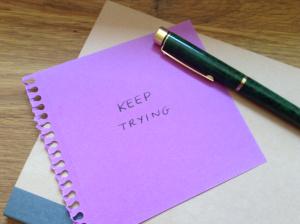 I recently wrote this article about rejection for a competition and rather fittingly, it didn’t get anywhere. When I was telling some writer friends about this over lunch a few days ago (I had to see the funny side), they said I should post it on the blog so I’m doing it before I can change my mind (plus it’s the Friday afternoon graveyard slot). I don’t consider myself an expert on anything, but like most writers I know more about this subject than I ever wanted to. Writing this piece really helped me. Since then I’ve plunged headlong into writing a new novel, so at least I’m taking my own advice. If one more person finds something helpful here, it will have been worth doing.
I recently wrote this article about rejection for a competition and rather fittingly, it didn’t get anywhere. When I was telling some writer friends about this over lunch a few days ago (I had to see the funny side), they said I should post it on the blog so I’m doing it before I can change my mind (plus it’s the Friday afternoon graveyard slot). I don’t consider myself an expert on anything, but like most writers I know more about this subject than I ever wanted to. Writing this piece really helped me. Since then I’ve plunged headlong into writing a new novel, so at least I’m taking my own advice. If one more person finds something helpful here, it will have been worth doing.
All new writers know you have to persevere to get anywhere. The odds of success are terrible, especially if your aim is to have a novel traditionally published. Often the first major hurdle is trying to find an agent; I’ve heard the statistic that one in a thousand manuscripts attracts representation and whether or not that’s accurate, it certainly feels that way.
Getting an agent (if that’s what you want) is a huge step forward, but it’s actually only clearing the first hurdle. Authors face rejection in different forms at every stage of their career. That book may not get published. Your poetry or stories may not be accepted, or succeed in competitions. Sales and reviews may be disappointing. The list goes on…
Clearly, avoiding rejection isn’t an option, but finding a way to cope with it and keep writing definitely is. Rejection has been the unlikely catalyst for positive developments in my journey as a new writer. Although the message of this piece is very much ‘Focus on what you can control’ – first let’s talk about something you can’t.
You cannot fight rejection by pretending you don’t care or that it doesn’t hurt. It does. It can make you feel depressed, frustrated and angry. It can make you feel you’re wasting your time even trying, and question why you’re putting yourself through such an agonising process when the chances of it ever being you seem so low.
The answer is this: you can only be certain you’ll never make it if you stop trying. It’s hard to feel optimistic when you’re balancing fragile hopes against the instinct to protect yourself from disappointment. How often have you heard, ‘I’m not getting my hopes up’? But hope is important and so is believing in yourself, so be sure to celebrate any success, however small. Negative experiences damage confidence and stifle creativity but most of us write because we want to, need to and would ‘do it anyway’. If that’s how you feel, don’t let anything take that away!
By all means get drunk, weep, rant – whatever helps, really – when things go badly. (All of those work for me). Allow yourself to be miserable without feeling guilty or self-indulgent about it; writers are experts at beating themselves up. These are your words, your stories and although it’s nothing personal for the person doing the rejecting, of course it’s personal to you. Sulk for a few days, then pick yourself up and keep going.
Easy to say, but how do you stay positive when all you’re hearing is NO?
The way I think about rejection has changed a lot over the past couple of years. It is tempting to equate it with failure but they are not the same. In most fields, if you put in the hours, do the exams and get the qualification, success will follow – you achieve what you set out to do. The book world doesn’t work like that. As you’re often told by the bearer of bad tidings, ‘it’s very subjective.’ In most cases literary merit is far from the only consideration, so rejection doesn’t necessarily mean your work isn’t good.
It may be an essential part of being a writer, but there’s no point subjecting yourself to unnecessary rejections (now it’s all electronic you don’t even get to paper a room with them). Do your research. Be selective about where you send your writing and follow instructions to the letter. Always behave professionally – never vent in public or resort to rudeness - it’s a small world and bitterness is very unappealing. You wouldn’t be human if it wasn’t hard sometimes to see another author get the break you want so badly, but try to be encouraged by their success and to be generous – next time it might be you.

Rejection can only defeat you if you let it. It can be surprisingly motivating and inspire you to raise your game. Are you sure the work you’re sending out is your absolute best? I made the classic mistake of thinking my manuscript was ready when it was nowhere near and it cost me a dozen rejections. I didn’t understand how good you have to be to stand out in a world where your submission is one of thousands. Push yourself to become a better writer. Read as much and as widely as you can and learn from it. Be open to tough but constructive feedback from people you trust and get professional input if you possibly can. Surround yourself with like-minded people who understand what you’re going through – this mutual support is invaluable. Writing festivals and courses are brilliant but there are many ways to connect online. There’s no need for any writer to feel isolated.
Sadly there’s no magic formula for dealing with rejection and nothing which works for everyone. It takes time to figure out your own strategy so don’t worry if you’re not there yet. If rejection ever stops hurting, it means you’re free to do something else with your hopes and dreams. But since you’re reading this, I’m guessing that won’t be you.
Don’t just keep writing. Keep your hopes up.
Good luck!
To the many people supporting me or any other writer – thank you.
Would you like to share any tips for dealing with rejection?
*POSTSCRIPT*
Early next week I’ll be posting an indepth review of debut publishing sensation The Miniaturist by Jessie Burton, published by Picador on 3 July.

